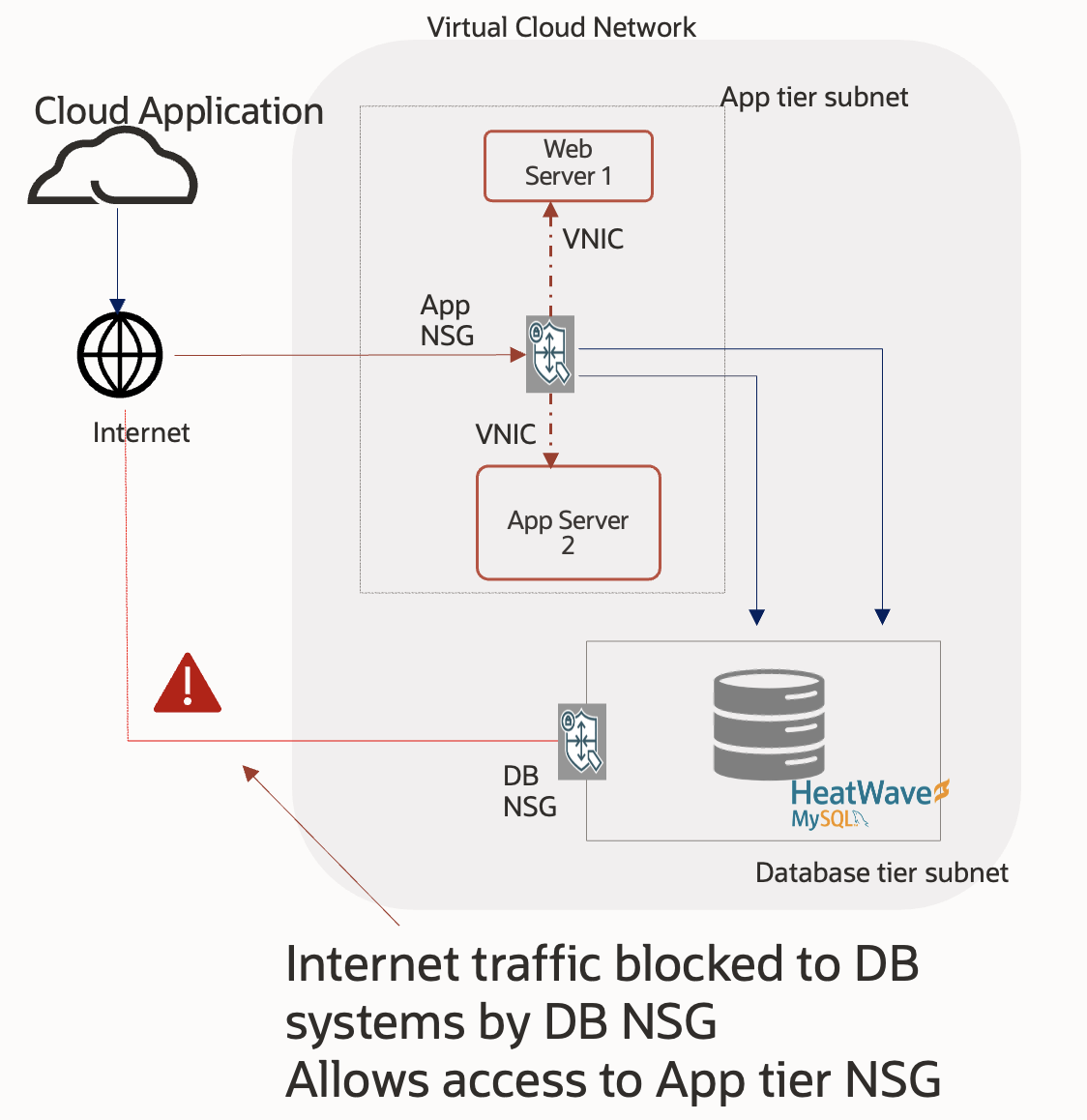HeatWave MySQL continues to evolve, bringing powerful enhancements that bolster security, improve backup retention, and streamline partition management. Oracle’s cloud-native database service seamlessly integrates transactional, analytical, and machine learning capabilities, ensuring robust performance and scalability. Over the last two quarters (March–June 2025), several notable updates have been introduced, enhancing security controls, optimizing data management, and delivering greater flexibility for developers and businesses alike. Below is a concise overview of the latest capabilities, focusing on new versions and features in the recent months.
- Network Security Groups (NSG):
- Provides enhanced fine-grained, workload-level network security
- Network Security Groups (NSGs) enable micro segmentation – a security architecture that allows you to apply stateful, virtual firewall rules at the VNIC level
- Enforces stronger network isolation and supports Zero trust architecture
- NSG is supported for both DB systems and their Read replicas (RR)
- Provides support for upto 5 NSGs

- REST
- HeatWave supports MySQL REST service starting from version 9.3.1.
- Enable REST on the DB system and create the required REST services and database objects in order to access the data through REST endpoints.
- Automatic Backup Retention
- When a user deletes a DB system, The default AutomaticBackupRetention in the deletion policy is now set to RETAIN instead of DELETE. This is applicable for DB systems created after the release date using SDK/CLI/Terraform. .
- The default setting for DB systems created in the Console remains unchanged and depends on the selected template.
- Soft Deletion of Backups reaching retention point
- Heatwave now enables soft delete by default for all backups, retaining deleted backups for 7 extra days in a DELETE SCHEDULED state before permanent removal.
- Backups in DELETE SCHEDULED state cannot be used but deletion can be canceled to restore them to ACTIVE state for further operations (move, copy or restore).
- HeatWave MySQL: Support for Versions 9.3.1, 8.4.5, and 8.0.42
- Supported MySQL Versions: HeatWave now supports MySQL 9.3.1 (Innovation), 8.4.5 (LTS), and 8.0.42 (Bugfix), all production-grade with security and bug fixes.
- New DB Systems creation default to MySQL 8.4.5, with options to select 9.3.0 or 8.0.42 during DB creation.
- Existing DB systems require manual upgrades (e.g., 8.4.4 to 8.4.5 or 8.0.41 to 8.0.42).
- Version 9.3.0+ Features: Supports ANALYZE TABLE for updating RAPID secondary engine table statistics and introduces HeatWave Temporary Tables stored in the HeatWave cluster.
- Choose 9.3.0 for cutting-edge features; opt for 8.4.5 (LTS) or 8.0.42 (Bugfix) for stable, established behavior
- HeatWave MySQL supports automated partition management – Load and unload only necessary data for better memory management and performance
- Creation of Asynchronous tasks for long running or complex queries or commands. Run them in the background without blocking other operations. Improves system performance and usability.
- HeatWave supports temporary tables to store intermediate data in hybrid columnar format for faster data transformation, aggregation and data analysis
- Bulk Load, which is used for ingesting data into the DB System, now supports tables that include the VECTOR data type
Summary:
The HeatWave product team continues to deliver innovations in availability, performance, operability, and developer productivity for all your business needs.
We encourage you to try them out and build small-scale applications using the Always Free resources on Oracle Cloud Free Tier. Please review the HeatWave MySQL release notes for the complete list of the new features.
Stay tuned for more exciting capabilities, and as always, thank you for using HeatWave MySQL!
Resources:
9.3.1 Innovation release notes
9.3.0 Innovation, 8.4.5 LTS and 8.0.42 bug fix release notes
